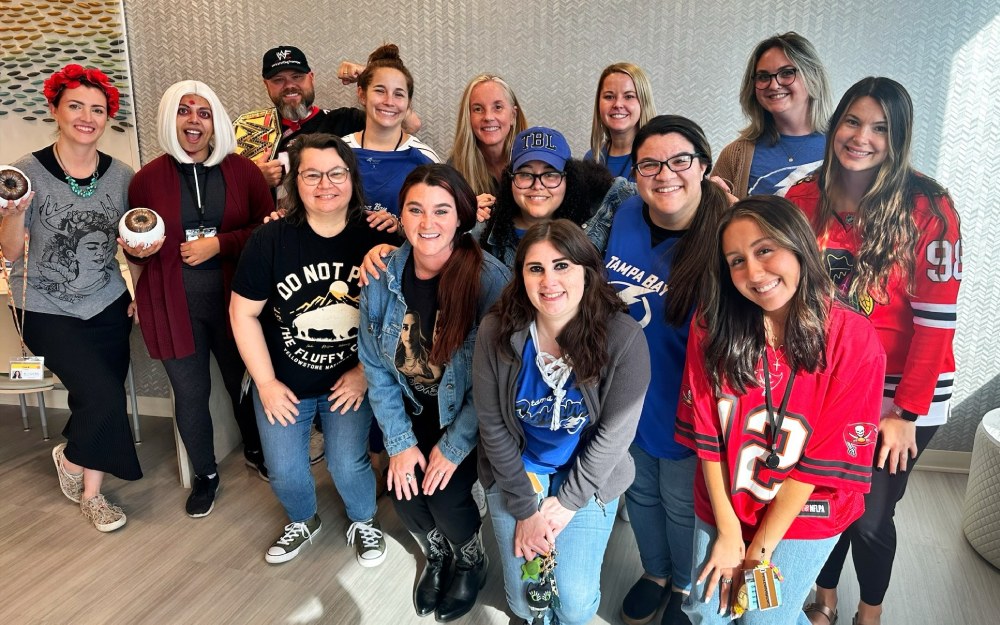
‘In the eye of the storm, we held firm’: Tampa teammates provide patients sense of normalcy during instability of Hurricane Milton
10/31/24 01:00:pm
A hurricane forecasted to potentially be one of the worst storms to hit Florida in a century carries with it countless unknowns, but following Hurricane Milton and its damage to Rogers’ Tampa clinic, teammates there say holding on to the familiar made all the difference.
“When you have all of those really critical unknowns and you're trying to plan for your own safety, providing patient care like our team did really is amazing,” says Kimberly Young Brazill, Tampa clinical services supervisor. “The back-to-back nature of those hurricanes made this one feel even scarier.”
In the wake of Hurricane Helene, the Tampa team kept up providing care to patients until the Monday before Hurricane Milton hit, switching to virtual care that day and then closing Tuesday ahead of the storm.
“It's really hard when you feel like crying yourself, but you can't because you've got to provide care for patients, and they're equally scared,” says Heather Steiner, senior director of operations for Rogers’ service area covering Tampa. “It's always amazing to me that during storms, we still have patients who want to attend and even come in in-person. The fact that they’re prioritizing being here is really a testament to the services we provide and what patients gain.”
Still partly closed as of the end of October, the nine-story building sustained roof and water damage from the hurricane following torrential rainfall, hurricane winds, and potential tornados.
Ahead of Hurricane Milton, Tampa teammates say questions were swirling.
“In my neighborhood, there are still mounds of debris everywhere from Hurricane Helene, because most people's homes flooded,” Kimberly says. “We were wondering, is there going to be a storm surge again? Are the five-foot-high piles of debris going to spread everywhere? There were a lot of unknowns.”
Rogers teammates stayed safe through the storm, saying they’re grateful for the three-day clinic closure.
“Hurricanes are unpredictable, but we do have the benefit of time to prep for them, and I am so grateful that our leadership made the call when they did,” says Amanda Altu, Tampa therapist. “Throughout our closure, leadership would check in, and there were several group chats going on with the staff supporting one another. As stressful and scary as the situation was, it was such a comfort to know that my team had my back. The thing about the culture of the Tampa clinic is that we really are a family. We laugh and celebrate during the good times, we have healthy competition during spirit week and yet still root for one another, we run when there is a daily challenge on the floor, and in the eye of the storm, we held firm to that foundation of flexibility and support.”
After the Wednesday storm, the Tampa clinic reopened virtual services Friday, while many in the area were still without gas for their cars or electricity for their homes.
“We had six staff members who had power who came together to support the patients who wanted to attend virtually,” says Tabitha Lennon, director of operations for Tampa and Miami. “There was a lot of teamwork going on that Friday and the week after, as most of our team didn't have power and we couldn't access the building. We had a lot of cross-coverage and leaning on people, and it was awesome to see teammates helping in any ways they could.”
Team members say having a strong telehealth foundation helped bring stability and normalcy, even during a volatile time.
“Now that virtual care is status quo, everyone knows how to do it,” Kimberly says. “We can make the switch clinic-wide quickly and efficiently, which I think is a huge stress reliever during a challenging situation.”
“I treat eating disorders, so even a couple days of patients being off-schedule can really throw them. Even just giving them the structure of breakfast time and lunch time in virtual care helps a lot, especially given that when we're all stressed, we don't eat very well, much less like kids who aren't eating,” says Claire Kinney, Tampa therapist. “We were able to provide care and a sense of familiarity and ease a little bit of anxiety during a situation where, even after the storm, things weren't back to normal. A lot of places were closed. We didn't have gas. There were still food shortages. Getting treatment, seeing peers, and talking with their therapist could help provide patients a distraction from all of the piles of debris in their yard. Offering any sense normalcy was really beneficial.”





